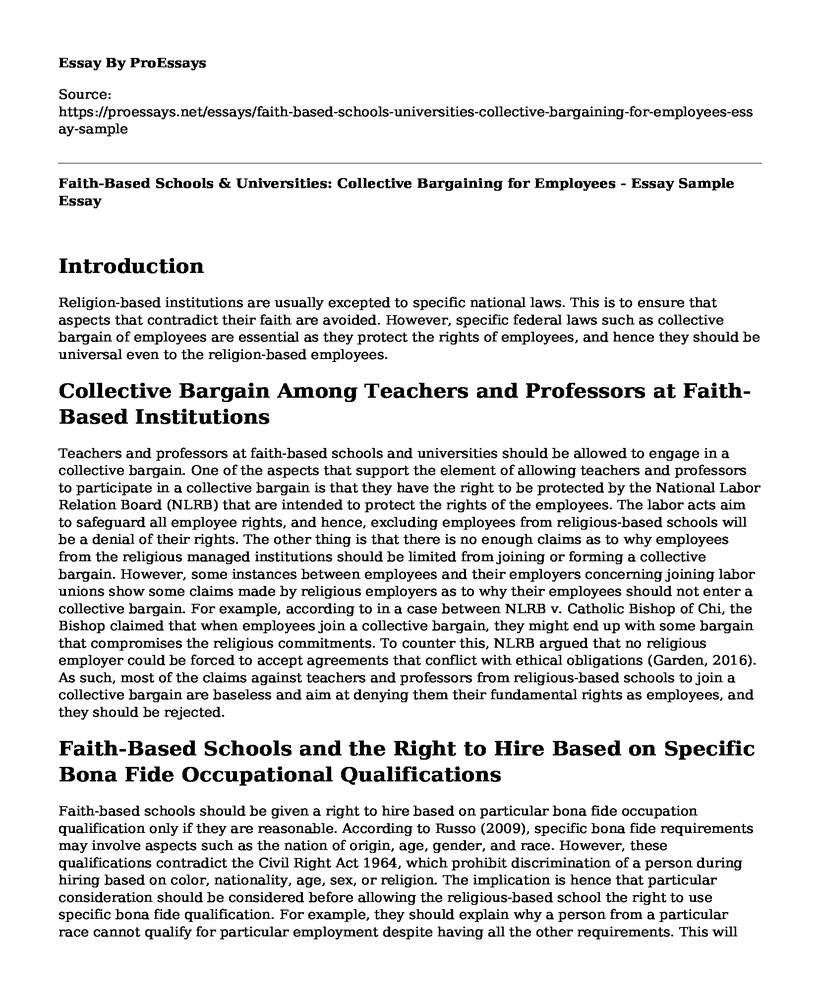Introduction
Religion-based institutions are usually excepted to specific national laws. This is to ensure that aspects that contradict their faith are avoided. However, specific federal laws such as collective bargain of employees are essential as they protect the rights of employees, and hence they should be universal even to the religion-based employees.
Collective Bargain Among Teachers and Professors at Faith-Based Institutions
Teachers and professors at faith-based schools and universities should be allowed to engage in a collective bargain. One of the aspects that support the element of allowing teachers and professors to participate in a collective bargain is that they have the right to be protected by the National Labor Relation Board (NLRB) that are intended to protect the rights of the employees. The labor acts aim to safeguard all employee rights, and hence, excluding employees from religious-based schools will be a denial of their rights. The other thing is that there is no enough claims as to why employees from the religious managed institutions should be limited from joining or forming a collective bargain. However, some instances between employees and their employers concerning joining labor unions show some claims made by religious employers as to why their employees should not enter a collective bargain. For example, according to in a case between NLRB v. Catholic Bishop of Chi, the Bishop claimed that when employees join a collective bargain, they might end up with some bargain that compromises the religious commitments. To counter this, NLRB argued that no religious employer could be forced to accept agreements that conflict with ethical obligations (Garden, 2016). As such, most of the claims against teachers and professors from religious-based schools to join a collective bargain are baseless and aim at denying them their fundamental rights as employees, and they should be rejected.
Faith-Based Schools and the Right to Hire Based on Specific Bona Fide Occupational Qualifications
Faith-based schools should be given a right to hire based on particular bona fide occupation qualification only if they are reasonable. According to Russo (2009), specific bona fide requirements may involve aspects such as the nation of origin, age, gender, and race. However, these qualifications contradict the Civil Right Act 1964, which prohibit discrimination of a person during hiring based on color, nationality, age, sex, or religion. The implication is hence that particular consideration should be considered before allowing the religious-based school the right to use specific bona fide qualification. For example, they should explain why a person from a particular race cannot qualify for particular employment despite having all the other requirements. This will help in ensuring that the civil rights act is not violated in the name of faith-based aspects that are not relevant.
Faith-Based Schools and Healthcare Plan
Faith-based schools should not be given a right to determine the type of benefit they offer to their employees under healthcare plans. Given such rights may make religious schools affect some of its employees negatively. This is because faith-based schools would like to offer health care plans that are in line with their beliefs. According to Metcalfe (2018), religious beliefs can sometimes compromise absolute healthcare necessities. For example, Catholic-based hospitals deny patients the right to emerging medical technologies, end of life decisions, and reproductive health services just because they contradict their beliefs. However, not all employees in faith-based schools agree with such sentiments. As such, health care rights stipulated by the health act should be used even in religious schools, and the employees are given a chance to choose to utilize the aspect of informed consent applied in health care.
Allowing teachers from religious-based institutions is a right; they should not be denied. What should be avoided is any bargain that contradicts the religious belief of a religious-based school. On the other hand, the right to employ individuals based on specific bona fide qualifications should be allowed to faith-based school only if there is evidence that such requirements are vital for an individual to operate in a given post. This will help to eliminate the essence of a possible violation of the civil rights act. Besides, faith-based schools should not be given a right to determine their employee benefit as they might deny them certain healthcare rights stipulated by health care act based on their belief.
References
Garden, C. (2016). Religious Employers and Labor Law: Bargaining in Good Faith. BUL Rev., 96, 109.
Metcalfe, A. (2018). Patient v. God: Determining the Standard of Care for Christian Science Practitioners in Medical Negligence Cases. Dalhousie J. Legal Stud., 27, 137.
Russo, C. J. (2009). The law and hiring practices in faith-based schools. Journal of research on Christian Education, 18(3), 256-271.
Cite this page
Faith-Based Schools & Universities: Collective Bargaining for Employees - Essay Sample. (2023, Feb 25). Retrieved from https://proessays.net/essays/faith-based-schools-universities-collective-bargaining-for-employees-essay-sample
If you are the original author of this essay and no longer wish to have it published on the ProEssays website, please click below to request its removal:
- Application for Scholarship to Study International Marketing
- Online Classroom Is Better Than Traditional Classroom Essay
- Translation Explanatory Synthesis Essay
- Essay Sample on Child Labor
- Administrative and Teacher Preparation Programs Essay Example
- Phi Theta Kappa - Executive Director Candidate Speech
- A Strategic Leadership Plan: A Personal Vision, Mission, and SMART Goals - Essay Sample







